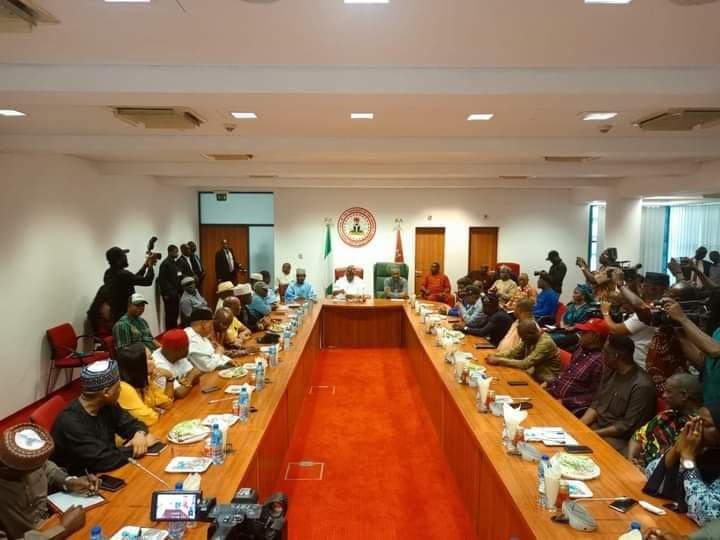Florence Sadiku
AN emergency meeting conveyed by the leadership of the National Assembly (NASS) with the Nigeria Labour Congress (NLC) and the Trade Union Congress (TUC) leaders Sunday evening failed to achieve its purpose of persuading the workers’ union to shelve its planned nationwide industrial action scheduled to commence today.
“For now, we don’t have the power to call off the strike, tomorrow (Monday) morning, the strike will kick off as we take their (NASS) plea asking us to call off the strike to our various organs,” said Festus Osifo , the President of TUC, after the meeting with NASS leadership.
Earlier, Osifo and his counterpart in the NLC, Joe Ajaero; met with Senate President Godswill Akpabio and Speaker of the House of Representatives Tajudeen Abbas. in Abuja. The meeting was a last-minute efforts by the legislators to persuade aggrieved workers to shelve their planned industrial action for a new minimum wage.
The National Assembly said the meeting was to “avert the impending industrial action” to commence on Monday 3 June 2024, “which would have severe repercussions on the populace and economy”. The decision of the organised labour followed the deadlock between the Federal Government and the unions over a new national minimum wage and reversal of the recent hike in electricity tariffs.
The Chairmen of the Senate and House Committees on Labour, Employment and Productivity respectively, Diket Plang, and Adegboyega Adefarati, were also at the meeting
On Friday, organised labour declared an indefinite nationwide strike, starting on Monday, 3 June 2024, due to the Federal Government’s refusal to increase the proposed minimum wage above N60,000.
The President of the NLC, Joe Ajaero, announced that the strike followed failed negotiations between the government and organised labour.
Despite the government’s final offer of N60,000, which included a recent increase from an initial N57,000, the labour unions found the proposal insufficient.
At the meeting, labour revised its demand, reducing it by N3,000 from the initial N497,000 proposed last week, setting the new proposal at N494,000.
Despite this concession, the negotiations remained deadlocked as the government maintained its offer of N60,000, leading to the declaration of a nationwide indefinite strike.
Meanwhile, after about four hours of deliberation with the NASS leadership led by Senate President, Godswill Akpabio on Sunday, the organised labour remained adamant on its resolve to embark on indefinite strike action. The Federal Government has said the sum of N494,000 national minimum wage being demanded by organised labour, which cumulatively amounts to the sum of N9.5 trillion bill, a development it says is capable of destabilizing the economy and jeopardizing the welfare of over 200 million Nigerians.
The Minister of Information and National Orientation, Mohammed Idris stated this at a news conference in Abuja in response to the threat by the organised labour to embark on strike if their demands were not met.
He said the offer of N60,000 minimum wage by the Federal Government, which translates to a 100% increase on the existing minimum wage of 2019, has been accepted by the organised private sector, which is a member of the tripartite committee of the negotiations team.
“The Federal Government’s New Minimum Wage proposal amounts to a 100% increase on the existing minimum wage 2019. Labour, however, wanted N494,000, which would increase by 1,547% on the existing wage.
“The sum of N494,000 national minimum wage which Labour is seeking would cumulatively amount to the sum N9.5 trillion bill to the Federal Government of Nigeria.
“Nigerians need to understand that whereas the FG is desirous of ample remuneration for Nigerian workers, what is most critical is that President Bola Ahmed Tinubu will not encourage any action that could lead to massive job loss, especially in the private sector, which may not be able to pay the wage demanded by the organised labour,” he said.
The Minister said even though Labour is keen on the take-home pay of about 1.2 million workers, the Federal Government is concerned with the welfare of over 200 million Nigerians based on its Guiding Principle of Affordability, Sustainability, and the overall health of the nation’s economy.
Idris appealed to organised labour to return to the negotiating table and embrace reasonable and realistic wages for their members.
He said because of the commitment of the Tinubu administration to the welfare of workers, the wage award of 35,000 for Federal workers would continue until a new national minimum wage is introduced.
Eighteen-Eleven Media


